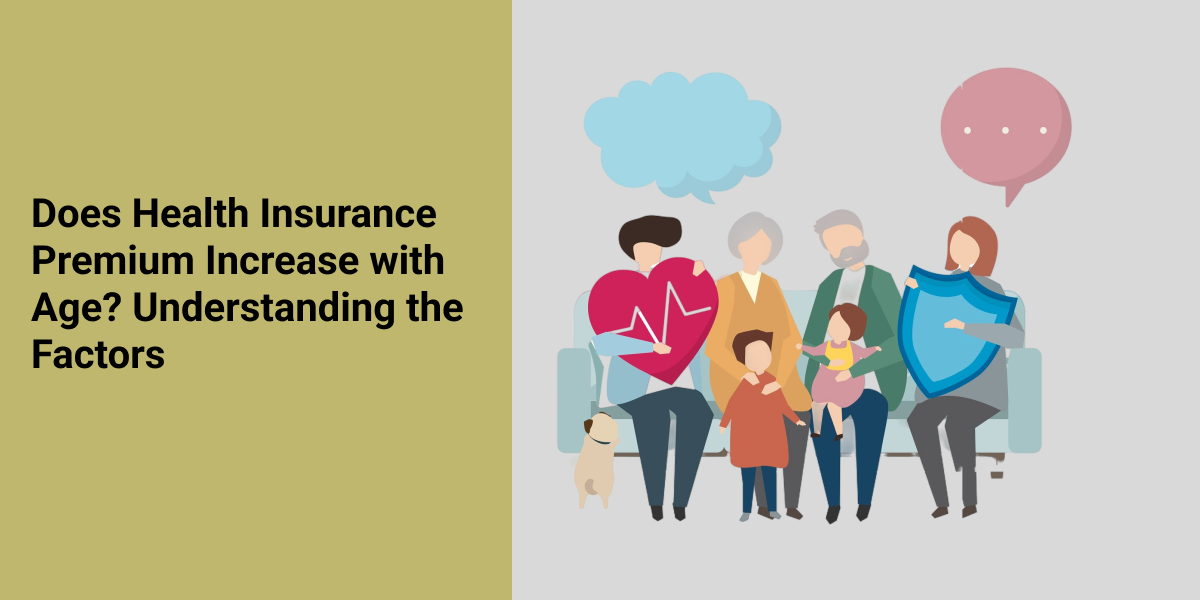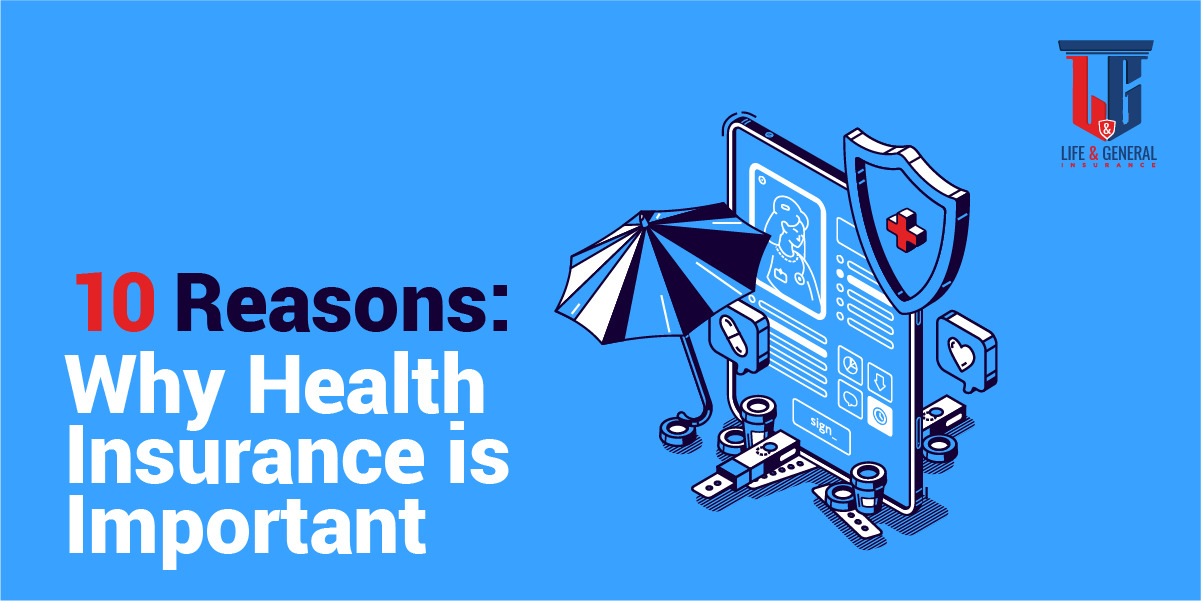Table of Contents
Investing in health insurance policies is a critical aspect of financial planning, particularly as individuals age. However, generally, health insurance premiums tend to increase with age, reflecting the higher risk and frequency of health issues that often accompany getting older in age. This correlation between age and premium costs is influenced by various factors, including the increased likelihood of chronic conditions, higher healthcare utilization, lifestyle changes and the cost of advanced medical treatments. Understanding these factors is essential for anticipating healthcare expenses and making informed decisions about health insurance coverage throughout different stages of life.
What are Health Insurance Premiums?
Health insurance premiums are the payments made, typically on a monthly basis, to an insurance company in exchange for coverage of medical expenses. These premiums are the fundamental cost associated with maintaining health insurance and ensure that policyholders have access to healthcare services when needed. The amount of the premium can vary widely based on several factors, including the type of insurance plan, the extent of coverage, and the policyholder’s individual health profile and age.
In addition to covering routine medical expenses, these health insurance premiums also contribute to a pool of funds used to pay for more significant healthcare needs, such as surgeries, hospital stays, and long-term treatments. While paying premiums does not eliminate out-of-pocket costs entirely, it significantly reduces the financial burden of unexpected medical events. Understanding how premiums are calculated and what they cover is crucial for making informed decisions about health insurance and managing healthcare costs effectively.
Related Blog: Health Insurance: Types, Benefits, Eligibility – A Complete Guide For You!
How Age Influences Health Insurance Premiums?
Age is one of the most significant factors that influences health insurance premiums in India. As individuals age, the risk of developing health issues increases, which leads to higher healthcare utilization and costs in older people. Insurance companies often adjust premiums to reflect this increased risk. This means that older adults generally face higher premiums than younger individuals, premiums increase with changes in the age brackets of existing policyholders. For example, a 2023 report from the Kaiser Family Foundation found that health insurance premiums for individuals aged 60-64 are, on average, three times higher than those for individuals in their 20s.
Additionally, current statistics underscore the stark difference in premium costs across different age groups. According to current data, a 40-year-old might pay around Rs 1500 per month for a mid-level health insurance plan, while a 60-year-old might pay over Rs 2000 per month for the same coverage. These differences highlight the importance of considering age when planning for long-term healthcare needs and budgeting for health insurance expenses accordingly. Understanding the impact of age on premiums can help individuals make better-informed decisions about their health insurance options and prepare for future costs.
Factors Contributing to Higher Premiums with Age
Several factors contribute to the increase in health insurance premiums as individuals age. Understanding these factors can help policyholders predict and manage their healthcare costs more effectively.
1. Increased Risk of Chronic Conditions
As people age, they are more likely to develop chronic conditions such as diabetes, heart disease, and arthritis which are often genetic or a result of lifestyle choices. These conditions often require ongoing medical attention, medications, and sometimes surgery, which leads to higher healthcare costs. Insurance companies, while computing the premium prices, factor in the increased likelihood of chronic illnesses, operations and medical costs which results in higher costs for older adults.
2. Higher Frequency of Healthcare Utilization
Older individuals tend to use healthcare services more frequently than younger ones. Regular doctor visits, preventive screenings, and specialist consultations become more common with age. This increased utilization drives up the overall cost of providing insurance coverage, which then shows up in higher premiums. Additionally, the need for more frequent and varied medical services adds to the risk profile considered by insurers.
3. Advanced Medical Treatments and Technologies
Advances in medical treatments and technologies, while beneficial, often attract higher costs from patients. Older adults are more likely to require these advanced treatments, whether for managing chronic conditions or addressing age-related health issues, operations, surgeries or more. The expenses often associated with cutting-edge medical care is another factor that leads insurers to increase premiums for older policyholders, ensuring that the costs are adequately covered in case of need.
4. Longer Life Expectancy
With advancements in the healthcare industry, people are living longer. This means that people will likely require healthcare services for an extended period at an older age. This longevity in life increases the cumulative cost of care over a person’s lifetime. Health insurance companies take into account the extended period of coverage needed for older adults, which contributes to higher premium rates to offset these anticipated long-term expenses.
5. Increased Probability of Hospitalization
Older adults have a higher probability of hospitalization due to critical health conditions, surgeries, or complications from existing comorbidities. Hospital stays can be particularly costly, encompassing not only medical treatments but also extended care and recovery services. This increased risk of hospitalization is a significant factor in the calculation of higher premiums for older individuals, as insurers prepare to cover these potentially substantial expenses through provided healthcare policies.
By understanding these factors, individuals can better navigate their health insurance options and plan for the financial aspects of their healthcare as they age.
Other Factors Affecting Health Insurance Premiums
While age is a significant determinant of health insurance premiums, several other factors also play crucial roles in shaping the cost of coverage. These elements collectively influence the overall risk assessment conducted by insurance companies, leading to variations in premium amounts.
1. Health Status:
Pre-existing conditions, overall health, and lifestyle choices such as smoking or alcohol consumption can significantly impact premium rates for policyholders. Insurers assess the likelihood of needing medical care based on these factors.
2. Geographic Location:
Where you live affects your health insurance premiums due to regional variations in healthcare costs, availability of medical services, and local regulations set by authorities. Urban areas with higher healthcare costs often lead to higher premiums.
3. Plan Type and Coverage Level:
The type of insurance plan (HMO, PPO, EPO, etc.) and the level of coverage chosen (bronze, silver, gold, platinum) influence premium costs. More comprehensive plans with lower out-of-pocket expenses typically have higher premiums.
4. Family History:
A family history of certain medical conditions such as cancer, heart attack and more can affect premiums prices because the individuals are at high risk for being affected. Insurers consider genetic predispositions to diseases when calculating risks.
5. Occupation:
Certain occupations carry higher health risks, either due to physical demands or exposure to hazardous conditions. These risks can lead to higher insurance premiums for individuals in such professions.
6. Gender:
Historically, gender has played a role in determining premiums, with women often paying more for health insurance due to specific healthcare needs. However, regulations like the Affordable Care Act have aimed to reduce such disparities.
7. Lifestyle and Habits:
Engaging in risky activities, such as extreme sports, can result in higher premiums due to the increased likelihood of injury and subsequent medical care.
8. Insurance Company Policies:
Each insurance company has its underwriting criteria and risk assessment methods, which can lead to variations in premiums for similar coverage between different insurers.
By considering these factors alongside age, individuals can gain a more comprehensive understanding of what influences their health insurance premiums and make more informed decisions about their healthcare coverage.
Strategies to Manage Health Insurance Costs as You Age
Managing health insurance costs becomes increasingly important and strenuous as you age, especially given the rising premiums and healthcare needs. If not managed properly, the process of paying premiums can get stressful. Hence it is important to consider employing effective strategies that can help mitigate these expenses and ensure that you maintain adequate coverage without financial strain.
- Shop Around for the Best Plans: Regularly compare different health insurance plans to find the one that offers the best coverage at the most affordable rate. Do not hesitate to switch plans if a better option becomes available.
- Take Advantage of Employer-Sponsored Plans: If you are employed, and your company offers a health insurance plan, consider staying with your employer’s health insurance plan, as it often provides better rates than individual plans.
- Explore Government Programs: Look into government or public company plans and their eligibility. There are various policies in the country both public and government sponsored that cater to health coverage for people aged 65 and older.
- Focus on Preventive Care: Engage in preventive healthcare practices to avoid more costly medical issues later. Regular check-ups, screenings, and healthy lifestyle choices can help maintain good health.
- Review Coverage Needs Annually: Assess your health insurance needs each year to ensure your plan still meets your requirements. Adjust coverage based on any changes in your health or financial situation.
- Seek Out Discounts and Assistance Programs: Look for discounts on prescription medications, and explore assistance programs that help cover healthcare costs, especially for seniors.
- Work with an Insurance Broker: Consulting with a knowledgeable insurance broker can help you navigate the complexities of health insurance options and find the most cost-effective plans.
- Manage Chronic Conditions Proactively: Properly managing chronic conditions through regular medical care and following treatment plans can help prevent future complications and reduce healthcare costs over time.
By implementing these strategies, you can better manage your health insurance costs as you age, ensuring you have access to necessary medical care without undue financial burden.
Expert Tips for Choosing the Right Health Insurance Plan
Choosing the right health insurance plan can be a very stressful task considering the variety of options and factors to consider. Even though information on plans is widely available, finding an expert to advise on the matter can simplify this process while helping you select a plan that fits your healthcare needs and budget effectively.
- Assess Your Healthcare Needs: Evaluate your current health status, medical history, and anticipated healthcare needs. Consider how often you visit the doctor, the types of services you require, and any ongoing treatments or medications.
- Compare Costs Beyond Premiums: While premiums are an important factor in deciding the health care plan, also look at deductibles, copayments, coinsurance, and out-of-pocket maximums. A plan with a lower premium may have higher out-of-pocket costs, which can add up if you require frequent care.
- Check the Network of Providers: Ensure that your preferred doctors, hospitals, and specialists are included in the plan’s network. Out-of-network care can be significantly more expensive and may not be covered by your insurance. Making your healthcare plan useless.
- Review Prescription Drug Coverage: Examine the plan’s formulary to see if your medications are covered and at what cost. Some plans offer better prescription drug coverage, which can be crucial if you take regular medications.
- Understand the Plan Types: Familiarize yourself with the differences between HMOs, PPOs, EPOs, and other plan types. Each has its own rules regarding network usage, referrals, and out-of-network coverage, which can affect your flexibility and costs.
- Consider Future Needs: Think about potential changes in your health or life circumstances that may impact your insurance needs. Choose a plan that offers flexibility and can accommodate changes such as new family members or evolving health conditions.
By following these expert tips, you can navigate the complexities of health insurance selection with confidence, ensuring that you choose a plan that provides comprehensive coverage while fitting within your financial means.
FAQs About Changes in Health Insurance with Age
As individuals age, health insurance premiums evolve, often leading to questions about costs, plan options, and financial preparedness. Here are answers to some frequently asked questions about how health insurance changes with age.
Q1. At what age do health insurance premiums typically start increasing?
Health insurance premiums often begin to increase significantly once an individual reaches their 40s. This rise is due to the higher risk of developing chronic conditions and the increased likelihood of needing medical services. However, the most noticeable jump in premiums typically occurs after age 55, reflecting the heightened healthcare needs associated with aging.
Q2. Can I keep the same health insurance plan as I age?
Yes, you can keep the same health insurance plan as you grow older, but it is also important to review your coverage annually to ensure it still meets your needs. Employer-sponsored plans may continue as long as you remain employed, and individual plans can be renewed. However, once eligible for special care (usually at age 65), you might want to consider transitioning to a critical health care plan, which is specifically designed for older adults.
Q3. How can I estimate my health insurance costs for retirement?
To estimate health insurance costs for retirement, consider your current health status, potential future medical needs, and the type of insurance coverage you might need, such as critical health insurance plan and supplemental plans. Tools and calculators provided by insurance companies and financial advisors can help project these costs. It is also wise to account for potential increases in premiums and out-of-pocket expenses over time.
Q4. Can lifestyle changes affect health insurance premiums as I age?
Yes, lifestyle changes can significantly impact health insurance premiums. Maintaining a healthy lifestyle through regular exercise, a balanced diet, and avoiding smoking can reduce your risk of developing chronic conditions, potentially leading to lower premiums. Some insurers offer wellness programs and incentives for healthy behaviors, which can also contribute to more affordable premiums.
Q5. How can I prepare financially for increasing health insurance costs as I age?
Preparing financially for increasing health insurance costs involves several strategies. Start by saving early, utilizing health savings accounts (HSAs) if eligible. Regularly review and adjust your retirement savings plan to include projected healthcare expenses. Consider purchasing long-term care insurance to cover services not included in standard health insurance. Additionally, staying informed about changes in Medicare and other senior health programs can help you make cost-effective decisions.
Conclusion
Understanding the nuances of health insurance as you age is crucial for maintaining financial stability and ensuring access to necessary healthcare services at the right time without having to worry about the additional costs or financial burdens. Meanwhile, also understanding how premiums increase with age, the factors that contribute to these rises, and strategies to manage costs can empower you to make informed decisions about your health insurance.
By taking proactive steps, such as comparing plans, utilizing health savings accounts, and exploring government programs, you can mitigate the impact of rising premiums. Additionally, maintaining a healthy lifestyle and staying informed about insurance options will help you better prepare for the financial demands of healthcare in your later years.
To make sure you take the proactive steps at the right time, L&G insurance can not only help you understand health insurance but also lead you to the right plans making your financial future secure and well-planned.
Take Control of Your Health Insurance Costs Now!
Taking control of your health insurance premiums and knowing that what you invest will always come in handy in case of emergency is essential for financial well-being and peace of mind. By actively managing your coverage and expenses, you can ensure that you are prepared for both expected and unexpected healthcare needs.
Start by reviewing your current health insurance plan and comparing it with other available options to find the best fit for your needs and budget. Implement strategies such as utilizing preventive care, exploring government programs, and maintaining a healthy lifestyle to reduce your overall healthcare expenses. If needed, reach out to our industry experts with years of experience who can help you navigate through the technicalities and also help make the decision making process easy. Taking these steps now can help you secure more affordable and comprehensive coverage for the future.




